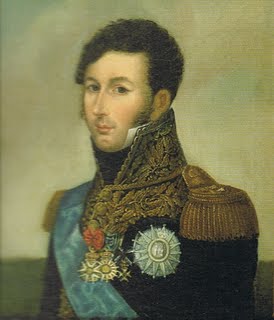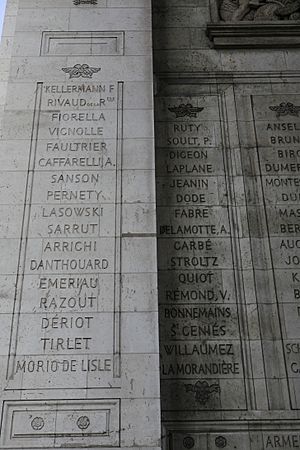Jean-Toussaint Arrighi de Casanova facts for kids
Quick facts for kids
Jean-Toussaint Arrighi de Casanova
Duke of Padua
|
|
|---|---|

General Arrighi de Casanova
|
|
| Born | 8 March 1778 Corte, France |
| Died | 22 March 1853 (aged 75) Paris, France |
| Allegiance | |
| Years of service | 1796-1814 |
| Rank | General of Division |
| Commands held | Cavalry, Infantry |
| Battles/wars | |
| Awards | Duc de Padoue |
| Relations | Cousin (in law) of Napoleon Bonaparte |
| Other work | Deputy, Senator Governor of Les Invalides (1852-1853) |
Jean-Toussaint Arrighi de Casanova was a French soldier and diplomat who lived from 1778 to 1853. He was also known as the Duke of Padua. He fought in the French Revolutionary Wars and the Napoleonic Wars, which were major conflicts in Europe. Later in his life, he became involved in French politics. An interesting fact is that he was a cousin of the famous leader Napoleon Bonaparte.
Contents
Early Life and Military Beginnings
Jean-Toussaint Arrighi de Casanova was born in 1778 in Corte, a town on the island of Corsica. When he was nine years old, he began studying at a military school in Rebais, France. Later, he attended the University of Pisa before returning to Corsica in 1796.
Arrighi de Casanova had a special connection to Napoleon Bonaparte. He was married to one of Napoleon's cousins. Because of this family tie, he became a lieutenant in the Army of Italy and worked directly with Napoleon.
Adventures in Egypt and Italy
Arrighi de Casanova also worked as a secretary for the French government in Rome. This was when Napoleon's brother, Joseph Bonaparte, was the French ambassador there.
He soon returned to military life and joined Napoleon's Egyptian campaign. During this time, he was wounded in the Battle of Salieh. He also took part in important battles like the sieges of Jaffa and Acre. He was promoted to captain during these campaigns.
At the Siege of Acre, Arrighi de Casanova was seriously wounded. A bullet hit Napoleon's hat and then struck Arrighi in the throat, cutting an artery. The surgeon, Dominique Jean Larrey, thought the wound would be fatal. However, the surgeon managed to save his life. After recovering, Arrighi returned to France just in time to fight in the 1800 Italian campaign, including the Battle of Marengo.
Napoleonic Wars and Later Career

Five years later, when the War of the Third Coalition began, Arrighi de Casanova became an aide-de-camp (a personal assistant) to Marshal of the Empire Louis Alexandre Berthier. He was wounded again at the battle of Wertingen but still fought in the battle of Austerlitz two months later.
In 1806, he was made a Major-colonel of the Guard dragoons, who were a type of cavalry soldier. He fought in the War of the Fourth Coalition in 1806 and 1807. He was promoted to brigadier general on the battlefield at the Battle of Friedland.
Duke of Padua and Major Commands
In 1808, Arrighi de Casanova was given the title of duc de Padoue (Duke of Padua). He was sent to Spain with the Guard's cavalry. After returning to France, he joined the new Army of Germany. He fought against the Austrians in the fierce battles of Aspern-Essling and Wagram.
By 1810, he became a general inspector of cavalry. Two years later, he was given command of all French troops along the North Sea coastline. He led the III Cavalry Corps and fought in many battles between the Elbe and the Rhine rivers. He was also the governor of Leipzig during the huge Battle of Nations.
During the 1814 Campaign in France, Arrighi de Casanova commanded an infantry division. He helped cover Marshal Auguste de Marmont's retreat at the Battle of La Fère Champenoise and then took part in the Battle of Paris.
Exile and Return to Politics
During the Hundred Days, when Napoleon briefly returned to power, Arrighi de Casanova was sent to Corsica. After Napoleon gave up his power for good, Arrighi de Casanova went into exile in Italy. He was allowed to return to France in 1819.
In 1849, he became a representative for Corsica in the National Assembly of France. Later, he was elected as a senator. His last important job was Governor of the Invalides, a famous complex in Paris that houses military veterans.
Recognition
Jean-Toussaint Arrighi de Casanova's name is proudly displayed on the Arc de Triomphe in Paris. This monument honors those who fought for France. He also received several important awards, including:
- Chevalier in the Legion of Honour
- Grand Cross in the Order of the Reunion
- Knight in the Military Order of Max Joseph from Bavaria
See also
 In Spanish: Jean-Thomas Arrighi de Casanova para niños
In Spanish: Jean-Thomas Arrighi de Casanova para niños
 | Sharif Bey |
 | Hale Woodruff |
 | Richmond Barthé |
 | Purvis Young |

